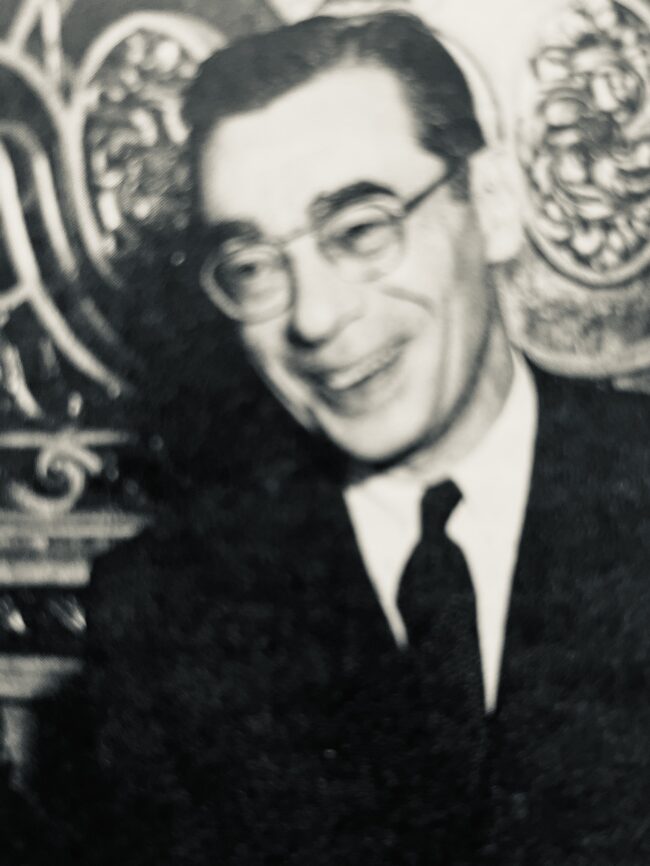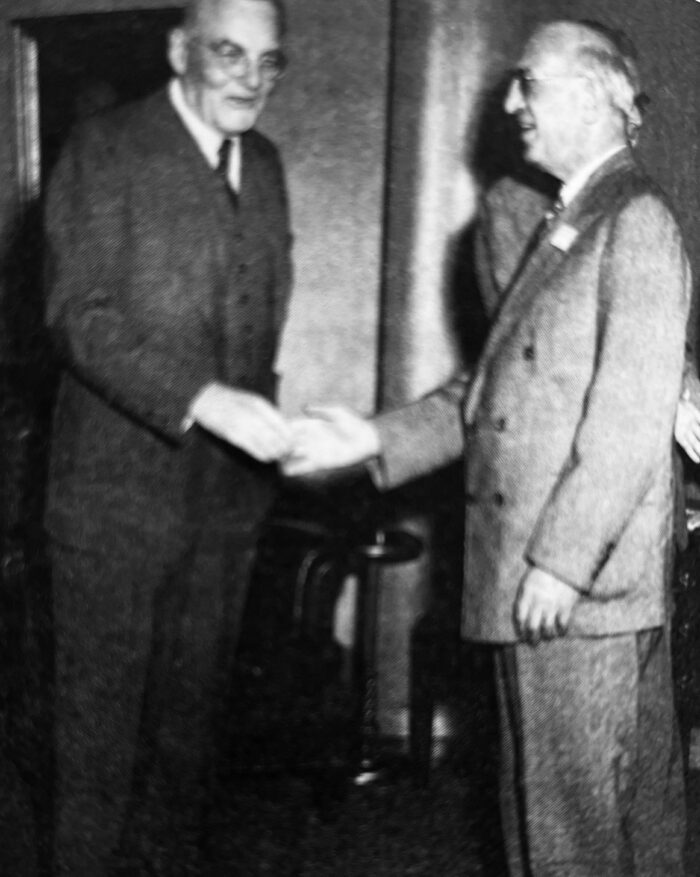The war that Israel has been waging against Hamas and other armed groups in the Gaza Strip since last October has raised some unsettling issues and truths.
Since its eruption, we have seen that a minority of Jews in the United States are anti-Zionist and pro-Palestinian.
Jewish Voice for Peace has mounted demonstrations calling for an immediate ceasefire and denouncing Israel’s air and ground offensive as an act of genocide. Jewish students have been among the protesters at the encampment set up by Palestinian American students on the campus of Columbia University in New York City.
Since the birth of Israel in 1948, the vast majority of Jews in the United States have supported Jewish statehood and considered it a sacred cause. But as Geoffrey Levin notes in Our Palestine Question: Israel and American Jewish Dissent, 1948-1978 (Yale University Press), a much smaller proportion of Jews have been critical of Israel’s policies toward the Palestinians. While most of these critics have been leftists, a significant number have been highly-placed conservative members of the Jewish establishment.
“This disconnect emerged because Zionism, as implemented in Israel, contradicted some of the core values that American Jews had championed in their push for an inclusive America,” writes Levin, a professor of Middle Eastern and Jewish studies at Emory University.
“As a self-declared Jewish state, Israel prioritized Jewish interests over the needs of non-Jews born in the lands that it controlled,” he adds. “This was clear in its immigration policy, which welcomed Jews while preventing Palestinian refugees from returning to their homes. It also manifested itself domestically in that until 1966 Israel’s Arab minority, despite receiving Israeli citizenship in 1952, faced many onerous military government restrictions …
“Israeli leaders justified policies that protected and privileged the ethnic-national majority in part as a defensive response to centuries of anti-Jewish persecution, expulsions, and genocide … In contrast, for many American Jews, this same history led them to identify with other beleaguered minorities and dispossessed peoples. While Israel and Jewish refugees most often earned American Jewish sympathy, it should be no surprise that there was always some undercurrent of American Jewish empathy for the Palestinians.”
Levin says that Israeli diplomats watched American Jewish interest in Palestinian rights issues with “deep suspicion,” plotting to undermine Jews who wrote about this sensitive topic and often succeeding in getting them removed from positions of influence. They were concerned that these individuals might weaken American Jewry’s commitment to Israel, harm Israel’s public image and damage Israel’s relationship with the United States.
As Levin points out in his thoughtful work, which was published last year, Zionism was a hard sell in certain quarters of the Jewish community. Until 1948, the Jewish leadership did not always regard anti-Zionism as antisemitic, while some Jewish leaders considered themselves non-Zionists. This was especially true with respect to the American Jewish Committee, the most politically influential organization of the 1950s.
Its unease about Zionism stemmed, in part at least, from its belief that Jews were solely a religious group rather than a nationality. It feared that Zionism would potentially raise doubts about American Jews’ loyalty to the United States.

This concern prompted the president of the American Jewish Committee, Jacob Blaustein, to compel Israeli Prime Minister David Ben-Gurion in 1950 to clarify that Israel made no claims on the political loyalty of non-Israeli Jews.
While the American Jewish Committee eventually came to terms with the existence of a Jewish state, the American Council for Judaism hewed to a recalcitrant policy. Formed in 1942 by Reform rabbis, it publicly campaigned against Zionism, regarding it as a threat to the position of Jews, and endorsed a non-sectarian binational state in Palestine.

Its chief official, Rabbi Elmer Berger (1908-1994), was somewhat influential during the presidency of Dwight Eisenhower and his secretary of state, John Foster Dulles. But after criticizing Israel for its “aggression” during the Six Day War, Berger was attacked and forced to resign.
By then, the American Council for Judaism’s chairman, Lessing Rosenwald, had moderated his antagonism toward Israel, leaving Berger uncomfortably exposed as a pro-Arab figure.

Levin also discusses the careers of three other American Jewish figures whom the Israeli government deemed problematic: Don Peretz (1922-2017), James Marshall (1896-1987) and William Zukerman (1885-1961).
Peretz, the scion of a Sephardic Jewish family that had settled in Palestine after its expulsion from Spain in 1492, was born in Baltimore but lived in Palestine during his youth. Peretz’s father was an ardent Zionist, but Peretz diverged from this path after coming under the influence of Rabbi Judah Magnes, the president of the Hebrew University, who advocated a binational state in Palestine. Peretz, too, was drawn to the American Friends Service Committee, a Quaker-affiliated peace and social justice organization.
At Columbia University, where he specialized in Middle Eastern studies, Peretz focused on the plight of Palestinian refugees. He wrote scholarly articles for the Middle East Journal and turned his dissertation into a book, Israel and the Palestine Arabs, which he dedicated to Magnes.
Peretz was acquainted with Fayez Sayegh (1922-1980), a Palestinian activist born in Tiberias. Sayegh, the director of the Arab League office in New York City, played a key role in the 1975 United Nations vote declaring Zionism as a “form of racism.”
In 1956, the American Jewish Committee hired Peretz as its first Middle East consultant. He lasted until 1958. According to Levin, he lost his job due to Israeli pressure. Subsequently, he was a professor at the State University of New York at Binghampton and wrote a primer, The Middle East Today.
James Marshall, a leading figure in the American Jewish Committee, a civil liberties lawyer and the nephew of Magnes, never viewed himself as a Zionist, but neither did he regard himself as a foe of Jewish settlement in Palestine. However, leaning toward a binational state solution, he opposed the United Nations’ 1947 Palestine partition plan.
Marshall funded the first Arabic-Hebrew dictionary, published in the same year, in the misplaced hope that it would foster mutual understanding between Jews and Arabs.
Zukerman, a fixture in the American Yiddish press for decades, founded the Jewish Newsletter in 1948. An English-language publication, it critiqued the Israeli government and focused on the Palestinian refugee issue more thoroughly than any other Jewish newspaper in the United States.

To Israeli officials, he posed a threat. Levin thinks that his views on the Palestinians echoed those of the Bund, though Zukerman was never a member.
Zukerman’s articles also appeared in the London-based Jewish Chronicle. But after the Israeli ambassador in the United States complained that his pieces were causing Israel “considerable harm,” he was let go.
Breira, created in 1976, was equally critical of Israel’s approach to the Palestinians, but it argued that Palestinian statehood would serve Israeli interests.
Levin believes that Breira was the first national American Jewish organization to openly oppose Israel’s occupation of the West Bank and the Gaza Strip. Briera folded in 1978 after a torrent of abuse and criticism, but it was succeeded by the New Jewish Agenda, Americans for Peace Now and J Street.
In passing, Levin mentions Noam Chomsky, an anti-Zionist and a linguist who had once considered making aliyah. Like Berger and Peretz, he supports a binational state as an alternative to Israel.
Rightly or wrongly, Levin is of the opinion that American Jews in greater numbers will endorse Palestinian rights as “a meaningful extension” of their Jewish identity.
“Rather than being a countercurrent in American Jewish politics, Palestinian rights advocacy has become a realm of Jewish politics in and of itself. And despite enduring uproars over it, it will define the transnational relationship between Jews even more as time goes on.”
He may be right. With the war in Gaza still raging, the debate over the political future of the Palestinians is only now getting started in earnest.
